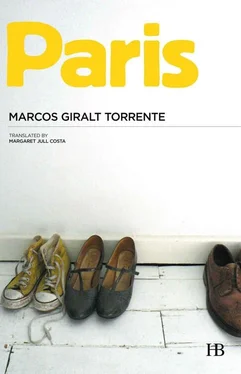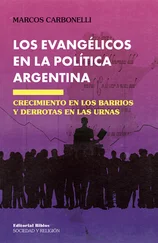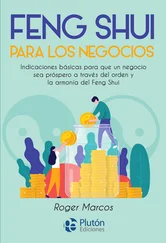Marcos Giralt Torrente - Paris
Здесь есть возможность читать онлайн «Marcos Giralt Torrente - Paris» весь текст электронной книги совершенно бесплатно (целиком полную версию без сокращений). В некоторых случаях можно слушать аудио, скачать через торрент в формате fb2 и присутствует краткое содержание. Год выпуска: 2014, ISBN: 2014, Издательство: Hispabooks, Жанр: Современная проза, на английском языке. Описание произведения, (предисловие) а так же отзывы посетителей доступны на портале библиотеки ЛибКат.
- Название:Paris
- Автор:
- Издательство:Hispabooks
- Жанр:
- Год:2014
- ISBN:9788494228452
- Рейтинг книги:5 / 5. Голосов: 1
-
Избранное:Добавить в избранное
- Отзывы:
-
Ваша оценка:
- 100
- 1
- 2
- 3
- 4
- 5
Paris: краткое содержание, описание и аннотация
Предлагаем к чтению аннотацию, описание, краткое содержание или предисловие (зависит от того, что написал сам автор книги «Paris»). Если вы не нашли необходимую информацию о книге — напишите в комментариях, мы постараемся отыскать её.
Paris — читать онлайн бесплатно полную книгу (весь текст) целиком
Ниже представлен текст книги, разбитый по страницам. Система сохранения места последней прочитанной страницы, позволяет с удобством читать онлайн бесплатно книгу «Paris», без необходимости каждый раз заново искать на чём Вы остановились. Поставьте закладку, и сможете в любой момент перейти на страницу, на которой закончили чтение.
Интервал:
Закладка:
This was the scene that greeted me as I entered the kitchen. Had the scene lasted any longer, they would have noticed me, but they were both so intent on waiting for the other to take the initiative that neither of them saw me. I had time to ponder whether to say hello or to beat a silent retreat, then I saw my mother change position; she raised her eyes and sat up very straight in her chair. “Give me the phone number, then, all offices have phones,” I heard her say, “what could be easier?” Those three short phrases were spoken in a much softer voice than the ones that had led me to the kitchen, but they had the effect on my father of a whiplash, making him withdraw still further into himself; he removed his hands from the edge of the sink and folded his arms across his chest. It was then that he saw me. He had looked briefly at my mother and was about to go back to staring at the floor when something made him glance in my direction. Contrary to what one might expect, he reacted very swiftly. A flicker of embarrassment crossed his face, but he immediately corrected this expression and smiled at me rather too broadly, as though he didn’t want to give the impression that this change concealed any selfish desire, if not a desire for a patently impossible escape route, at least for the brief truce my presence would allow him. What happened next is the reason why I remember that day so clearly. I’ve thought about it a lot, and yet I still can’t bring the necessary distance to bear on any analysis of it. I don’t really know how to explain; it’s a fragment that endures on its own — isolated and unresolved. The fact is that when my mother realized from my father’s expression that I was there, she turned in her chair, and when I saw the look on her face, my instinctive response was a desire to run away and leave them alone. For the first time ever, I saw that she was not in control of her feelings. She didn’t seem aggressive, nor was it her intention to make me feel that my presence there bothered her; it was simply that I thought I saw a warning light in her eyes signaling that she was about to do something rash — and I feared the consequences.
“Your dear father has been deceiving us.”
My mother was not the ironic sort, not in normal situations, and of course not in situations that were no laughing matter. I imagine that she regretted these words as soon as she had spoken them. What disturbed me was not what her words revealed about my father but the irony, an irony even more troubling because it belied the calm, almost tender tone in which she said them. Of course, that isn’t what I thought at the time, although, in a way, that is what I picked up on. Somehow, only that word “dear” made any sense to me and spoke faithfully to me of my mother’s state of mind and prevented the contents, the phrase itself, from shaking my world more than it did. True, I was speechless and shocked, but it didn’t honestly affect me that much. The proof is that although I was, inevitably, looking at my mother — since it was she that had addressed those words to me — I have no memory of what I saw and observed while she was saying them and no recollection even of what happened afterward. Time has remained frozen and empty. I can recall nothing until the moment I decided to leave the room, and then it was my father, not my mother, who caught my eye. I made as if to withdraw, and before I left, I noticed that he turned very pale then immediately regained his composure. All I remember of what happened as I walked down the hallway, leaving the two of them behind me, is the click-clack of my mother’s heels on the floor and the sound of the kitchen door slamming shut.
The shouting did not start again until I’d reached my bedroom. I was aware of the aggression and anger in their voices, but I was far enough away not to be able to hear their actual words, and for what seemed an interminable length of time, I had to make do with listening only to the tone in which they spoke, but without understanding and, therefore, without knowing whether I should be worried or if it would all blow over. At a certain point, their comments became more and more spaced out, they spoke more and more softly, until, after a long silence, I heard footsteps on the parquet floor and the sound of the front door opening and closing. Then more footsteps came looking for me, and I did not have long to wait. My mother walked into my room, sat down on the chair next to my desk, drew me to her, and, resting her hands on my shoulders, forced me to crouch down as she pressed my head to her breast. I felt her tears running down my neck, but neither of us withdrew from that embrace until she had grown calmer and her tears had dried. We said nothing, we didn’t even mention my father. In the end, when she was feeling stronger, she lifted my head from where it lay nestled against her breast, slid her hands down to my waist and, raising me to my feet, said, “We probably won’t see him again.” I never found out how she knew that he’d been lying about his job; we never again talked about it.
XIV
My father came back the next day. And I was faced by a completely different scene from that of the previous afternoon, because when I got home from school, I found him sitting quietly in the living room with my mother. There was no music playing, they weren’t speaking. They were both immersed in their respective books, but there was no hint of yesterday’s storm. They both looked up when they heard me come in and smiled as if it were the most natural thing in the world to find them there together.
Practically all that remains of the days that followed is my feeling of bewilderment. My father continued going out and coming back at regular hours, integrated into the daily rhythm of the household as before, working, he said, at the same office where he had told us he was working before the argument. The normal thing, or so it seemed to me, would have been to see some sign, some remnant of embarrassment or even an explicit reference that would serve as a reminder of what had happened, as well as a recognition of the clean slate we had apparently decided to make of things since. However, during the days that followed, he behaved as if I hadn’t seen or heard what I hadn’t been able to help seeing and hearing. My mother, too, appeared to have accepted the situation, and she maintained her usual cool, reticent self, with not a trace in her eyes of the tears she had shed in my presence. This situation drove me to despair, I couldn’t understand the reasoning behind it, and I resented being excluded, especially when no one offered me any explanation; I resented being excluded from the pact they seemed to have sealed between them. In a way, that was the only time in my childhood when I had any real reason to feel betrayed by my mother. Since I couldn’t believe the comedy they were acting out, my desire to know her real state of mind was transformed into rancor and wounded pride. Then, gradually, I began to notice cracks in their performance (a look that lingered slightly longer than usual, an untimely sigh), and the tension eased. I began to understand and, I suppose, to forgive. I understood that there was no pact, only resignation, that I was not being marginalized, that my mother was only avoiding me because she had no way of explaining the situation. I didn’t understand then, but now I realize that my mother’s behavior was based on patience, on reasoned calculation, and not on an unconditional acceptance of the rules imposed by my father. Once the skirmish was over, she changed her approach, as if making a preemptive surrender were better than risking further upheavals. This meant that while everything seemed normal, it wasn’t, although that false capitulation threw up more anomalies than if the standoff had continued. We all knew what had happened: my father’s lie, his non-existent job. And yet not only did he continue leaving the apartment and coming back again just as before, going to a job that did not exist, my mother also behaved as if everything were perfectly all right. She asked nothing and said nothing. Everything continued as it had before the argument — the time the three of us spent in the living room talking, the same or similar weekend trips and outings. My mother made every effort to ensure that life carried on as normal. She laughed, made plans, and talked about the future. Her determination was praiseworthy; in retrospect, however, the results were not, I think, beneficial. On the other hand, there was my father, and although he was apparently doing the same as she, there was a considerable difference. He was the victor, and he had the confident air of someone who knows he has the right to dictate conditions. Slowly but surely, he began to introduce new elements that he would never have dared to before. He again began to receive frequent phone calls and sometimes disappeared for hours without a word of explanation.
Читать дальшеИнтервал:
Закладка:
Похожие книги на «Paris»
Представляем Вашему вниманию похожие книги на «Paris» списком для выбора. Мы отобрали схожую по названию и смыслу литературу в надежде предоставить читателям больше вариантов отыскать новые, интересные, ещё непрочитанные произведения.
Обсуждение, отзывы о книге «Paris» и просто собственные мнения читателей. Оставьте ваши комментарии, напишите, что Вы думаете о произведении, его смысле или главных героях. Укажите что конкретно понравилось, а что нет, и почему Вы так считаете.












